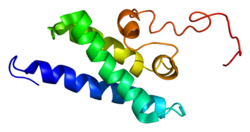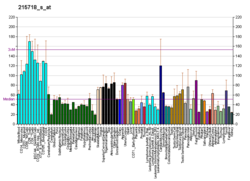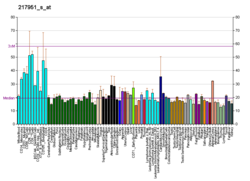Protein-coding gene in the species Homo sapiens
PHD finger protein 3 is a protein that in humans is encoded by the PHF3 gene .[ 5] [ 6]
^ a b c GRCh38: Ensembl release 89: ENSG00000118482 – Ensembl , May 2017^ a b c GRCm38: Ensembl release 89: ENSMUSG00000048874 – Ensembl , May 2017^ "Human PubMed Reference:" . National Center for Biotechnology Information, U.S. National Library of Medicine .^ "Mouse PubMed Reference:" . National Center for Biotechnology Information, U.S. National Library of Medicine .^ Fischer U, Struss AK, Hemmer D, Michel A, Henn W, Steudel WI, Meese E (Mar 2002). "PHF3 expression is frequently reduced in glioma". Cytogenet Cell Genet . 94 (3–4): 131–6. doi :10.1159/000048804 . PMID 11856869 . S2CID 44396216 . ^ "Entrez Gene: PHF3 PHD finger protein 3" . Nakajima D, Okazaki N, Yamakawa H, et al. (2003). "Construction of expression-ready cDNA clones for KIAA genes: manual curation of 330 KIAA cDNA clones" . DNA Res . 9 (3): 99–106. doi :10.1093/dnares/9.3.99 PMID 12168954 . Nagase T, Seki N, Ishikawa K, et al. (1997). "Prediction of the coding sequences of unidentified human genes. VI. The coding sequences of 80 new genes (KIAA0201-KIAA0280) deduced by analysis of cDNA clones from cell line KG-1 and brain" . DNA Res . 3 (5): 321–9, 341–54. doi :10.1093/dnares/3.5.321 PMID 9039502 . Struss AK, Romeike BF, Munnia A, et al. (2001). "PHF3-specific antibody responses in over 60% of patients with glioblastoma multiforme" . Oncogene . 20 (31): 4107–14. doi :10.1038/sj.onc.1204552 PMID 11464277 . Strausberg RL, Feingold EA, Grouse LH, et al. (2003). "Generation and initial analysis of more than 15,000 full-length human and mouse cDNA sequences" . Proc. Natl. Acad. Sci. U.S.A . 99 (26): 16899–903. Bibcode :2002PNAS...9916899M . doi :10.1073/pnas.242603899 PMC 139241 PMID 12477932 . Mungall AJ, Palmer SA, Sims SK, et al. (2003). "The DNA sequence and analysis of human chromosome 6" . Nature . 425 (6960): 805–11. Bibcode :2003Natur.425..805M . doi :10.1038/nature02055 PMID 14574404 . Ota T, Suzuki Y, Nishikawa T, et al. (2004). "Complete sequencing and characterization of 21,243 full-length human cDNAs" . Nat. Genet . 36 (1): 40–5. doi :10.1038/ng1285 PMID 14702039 . Beausoleil SA, Jedrychowski M, Schwartz D, et al. (2004). "Large-scale characterization of HeLa cell nuclear phosphoproteins" . Proc. Natl. Acad. Sci. U.S.A . 101 (33): 12130–5. Bibcode :2004PNAS..10112130B . doi :10.1073/pnas.0404720101 PMC 514446 PMID 15302935 . Ballif BA, Villén J, Beausoleil SA, et al. (2005). "Phosphoproteomic analysis of the developing mouse brain" . Mol. Cell. Proteomics . 3 (11): 1093–101. doi :10.1074/mcp.M400085-MCP200 PMID 15345747 . Gerhard DS, Wagner L, Feingold EA, et al. (2004). "The status, quality, and expansion of the NIH full-length cDNA project: the Mammalian Gene Collection (MGC)" . Genome Res . 14 (10B): 2121–7. doi :10.1101/gr.2596504 . PMC 528928 PMID 15489334 . Pallasch CP, Struss AK, Munnia A, et al. (2005). "Autoantibodies against GLEA2 and PHF3 in glioblastoma: tumor-associated autoantibodies correlated with prolonged survival" . Int. J. Cancer . 117 (3): 456–9. doi :10.1002/ijc.20929 PMID 15906353 . S2CID 32083805 . Beausoleil SA, Villén J, Gerber SA, et al. (2006). "A probability-based approach for high-throughput protein phosphorylation analysis and site localization". Nat. Biotechnol . 24 (10): 1285–92. doi :10.1038/nbt1240 . PMID 16964243 . S2CID 14294292 . Olsen JV, Blagoev B, Gnad F, et al. (2006). "Global, in vivo, and site-specific phosphorylation dynamics in signaling networks" . Cell . 127 (3): 635–48. doi :10.1016/j.cell.2006.09.026 PMID 17081983 . S2CID 7827573 .
This article incorporates text from the United States National Library of Medicine , which is in the public domain .
(1) Basic domains
(1.1) Basic leucine zipper (bZIP )(1.2) Basic helix-loop-helix (bHLH )
Group A Group B Group CPAS Group D Group E Group F
(1.3) bHLH-ZIP (1.4) NF-1 (1.5) RF-X (1.6) Basic helix-span-helix (bHSH)
(2) Zinc finger DNA-binding domains
(2.1) Nuclear receptor (Cys4 )
subfamily 1 subfamily 2 subfamily 3 subfamily 4 subfamily 5 subfamily 6 subfamily 0
(2.2) Other Cys4 (2.3) Cys2 His2 (2.4) Cys6 (2.5) Alternating composition (2.6) WRKY
(4) β-Scaffold factors with minor groove contacts
(0) Other transcription factors
 From Wikipedia the free encyclopedia
From Wikipedia the free encyclopedia







